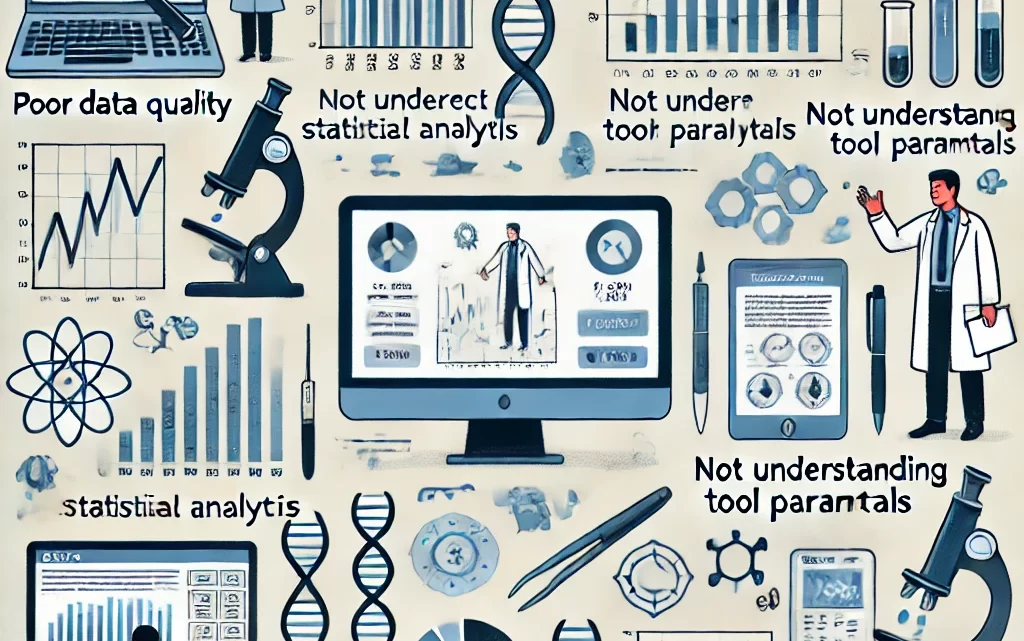
Ethical Considerations and Data Privacy in Bioinformatics: Navigating the Future of Genomic Research
July 8, 2025As bioinformatics advances, harnessing vast amounts of genomic and omics data to drive breakthroughs in personalized medicine, drug discovery, and disease research, it also raises critical ethical considerations and data privacy challenges. The sensitive nature of genomic data, which can reveal intimate details about an individual’s health, ancestry, and predispositions, demands robust safeguards to protect privacy, ensure informed consent, and mitigate bias. With the integration of artificial intelligence (AI) in analyzing these complex datasets, the need for responsible AI practices and clear ethical guidelines is more pressing than ever. This blog explores the trending ethical issues in bioinformatics, emphasizing the importance of data privacy, consent, and bias mitigation to build trust and equity in genomic research.
The Sensitivity of Genomic Data
Genomic data, derived from DNA sequencing or multi-omics approaches (e.g., transcriptomics, proteomics, metabolomics), is uniquely personal. It can reveal not only an individual’s risk for diseases like cancer or Alzheimer’s but also information about their ancestry, family members, or potential future health outcomes. This sensitivity makes genomic data a double-edged sword: while it fuels groundbreaking research, it also poses significant risks if mishandled.
For example, unauthorized access to genomic data could lead to discrimination by employers or insurers, stigmatization, or breaches of personal privacy. As bioinformatics increasingly relies on large-scale datasets—often shared across institutions or countries—the potential for misuse grows, making ethical considerations and data privacy paramount.
Key Ethical Issues in Bioinformatics
1. Data Privacy
Protecting the privacy of genomic data is a top priority. Unlike other personal data, genomic information cannot be fully anonymized, as DNA sequences are inherently unique and can be linked to an individual or their relatives. Key privacy challenges include:
Data Breaches: Genomic databases, whether stored locally or in the cloud, are vulnerable to cyberattacks, which could expose sensitive information.
Re-Identification Risks: Even de-identified genomic data can be re-identified using cross-referencing with public databases, such as ancestry platforms.
Third-Party Sharing: Genomic data is often shared with researchers, pharmaceutical companies, or AI developers, raising concerns about how it is used and who has access.
To address these risks, robust encryption, secure data storage, and strict access controls are essential. Regulations like the General Data Protection Regulation (GDPR) in Europe and the Health Insurance Portability and Accountability Act (HIPAA) in the United States set standards for protecting genomic data, but global harmonization of privacy laws remains a challenge.
2. Informed Consent
Informed consent is a cornerstone of ethical genomic research, ensuring that individuals understand the implications of sharing their data. However, obtaining meaningful consent in bioinformatics is complex due to:
Broad Data Use: Genomic data may be used for purposes beyond the original study, such as secondary research or commercial applications, which participants may not anticipate.
Incidental Findings: Genomic analyses can uncover unexpected health risks, such as predispositions to untreatable diseases, raising questions about whether and how to disclose these findings.
Dynamic Consent: Traditional consent models are static, but genomic research often involves ongoing data use. Dynamic consent platforms, which allow participants to update their preferences, are emerging as a solution.
For example, a patient contributing genomic data to a cancer study should be informed if their data might be used for unrelated research, such as studying mental health. Transparent communication and user-friendly consent processes are critical to maintain trust.
3. Bias Mitigation
AI-driven bioinformatics relies on machine learning models trained on genomic datasets, but these models can perpetuate biases if the data is not representative. Key bias-related challenges include:
Underrepresented Populations: Many genomic databases, such as those used for training AI models, are skewed toward individuals of European descent, leading to biased predictions that may not apply to other populations.
Algorithmic Bias: AI models can amplify existing biases in data, such as misprioritizing genetic variants in underrepresented groups, leading to inaccurate diagnoses or treatments.
Socioeconomic Disparities: Access to genomic testing and AI-driven tools is often limited to affluent regions, exacerbating healthcare inequities.
To mitigate bias, researchers must prioritize diverse datasets, incorporate fairness-aware algorithms, and validate models across populations. Initiatives like the All of Us Research Program aim to build inclusive genomic databases, but global efforts are needed to ensure equity.
The Role of Responsible AI Practices
As AI becomes integral to bioinformatics—analyzing genomic data, predicting disease risks, or identifying therapeutic targets—responsible AI practices are essential to address ethical concerns. These practices include:
Explainability: AI models must be interpretable, allowing researchers and clinicians to understand how predictions are made. Explainable AI (XAI) tools, such as SHAP or LIME, can highlight which genomic features drive a model’s output, fostering trust and accountability.
Transparency: Clear documentation of AI algorithms, data sources, and model limitations ensures that users can assess their reliability and ethical implications.
Fairness: AI models should be designed to minimize bias, such as by incorporating diverse training data or using fairness constraints during model development.
Privacy-Preserving Techniques: Methods like federated learning, differential privacy, or homomorphic encryption allow AI to analyze genomic data without compromising individual privacy.
For example, federated learning enables AI models to train on genomic data across multiple institutions without sharing raw data, preserving privacy while leveraging collective insights.
Real-World Implications
The ethical challenges of bioinformatics have real-world consequences. For instance, in cancer research, AI-driven multi-omics analysis relies on genomic data to identify biomarkers. If the data lacks diversity, the resulting models may fail to identify biomarkers relevant to non-European populations, leading to unequal treatment outcomes. Similarly, in rare disease diagnostics, inadequate consent processes could result in patients being unaware of how their data is used, eroding trust.
In agriculture, bioinformatics applications, such as studying plant stress responses, also raise ethical questions. Sharing genomic data from indigenous crops could lead to exploitation if intellectual property rights are not protected, highlighting the need for ethical guidelines in non-human applications.
Current Trends and Guidelines
As of 2025, ethical considerations and data privacy are trending topics in bioinformatics, driven by the rapid growth of genomic research and AI. Key developments include:
Global Ethical Frameworks: Organizations like the Global Alliance for Genomics and Health (GA4GH) are developing standardized guidelines for data sharing, consent, and privacy, promoting responsible practices worldwide.
Blockchain for Data Security: Blockchain technology is being explored to create secure, transparent systems for managing genomic data, ensuring traceability and user control.
Public Engagement: Efforts to educate the public about genomic research are increasing, fostering trust and encouraging participation in studies with clear consent processes.
For example, the GA4GH Data Use Ontology (DUO) standardizes consent terms, making it easier for researchers to use data ethically while respecting participant preferences.
The Future of Ethical Bioinformatics
Looking ahead, bioinformatics will continue to grapple with ethical challenges as genomic and AI technologies advance. Key priorities for 2025 and beyond include:
Enhanced Privacy Technologies: Innovations like secure multi-party computation will enable collaborative genomic research without compromising data privacy.
Inclusive Data Collection: Expanding genomic databases to include underrepresented populations will reduce bias and improve the generalizability of AI models.
Dynamic Consent Platforms: Digital tools will allow participants to manage their data preferences in real time, enhancing trust and engagement.
Regulatory Evolution: Governments and organizations will need to update regulations to keep pace with advances in AI and genomics, ensuring ethical use without stifling innovation.
Conclusion
As bioinformatics transforms healthcare and research through genomic and omics data, ethical considerations and data privacy remain at the forefront. Issues like informed consent, bias mitigation, and privacy protection are critical to ensuring that the benefits of bioinformatics—such as personalized medicine and novel therapies—are realized equitably and responsibly. By embracing robust guidelines and responsible AI practices, the field can build trust, protect sensitive data, and foster inclusive innovation. As we navigate the ethical landscape of bioinformatics in 2025, the focus on privacy, fairness, and transparency will pave the way for a future where genomic research empowers individuals and advances global health.

















